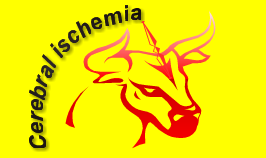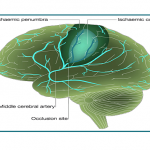Cerebral Ischemia
Cerebral ischemia or cerebral Insult is a condition characterized by low intracerebral blood perfusion due to a bloodstream block or interruption, the decreased blood up-flow to the cerebrum below the level of metabolic demands prompts poor oxygen supply or cerebral hypoxia and subsequently in a very short time cerebral tissue cells will die provoking an ischemic stroke. It is a sub-sort of stroke with both sub-arachnoid bleeding and intracerebral pressure.
Ischemia expedites changes in cerebral metabolism, decreases the metabolic rates, and leads into vigor emergency crisis.
There are two types of ischemia:
– Central ischemia, which is limited to a particular area of the mind
– Generalized ischemia, which includes wide regions of the cerebral tissue.
The principle side effects include:
– Disabilities in vision
– Poor development of coordination’s
– Talking problems
The explanations for cerebral ischemia fluctuate from sickle cell disease to inborn heart deformities, vascular diseases such as aneurysm. Manifestations of cerebral ischemia can incorporate obviousness, poor vision “difficulty seeing” and issues with coordination, one side paralysis.
Cerebral ischemia can provoke a stroke, cardiorespiratory capture, and irreversible mind degradation “permanent changes”.
Causes from Cerebral emboli that is formed from ruptured plaques / thrombi or, rarely, calcific materials from the walls of the carotid veins.
Symptoms
The symptoms of cerebral ischemia reflect the anatomical location of the affected area “the part experiencing blood and oxygen lack”. Ischemia within arteries expanding from the inner carotid supply route might bring some manifestations like:
– Lack of sight in one eye
– Paralysis in one arm or leg
– Paralysis in one side of the body
Ischemia within the arteries branching from the vertebral supply routes and arteries in the back of the brain might bring those side effects:
– Unsteadiness
– Vertigo
– Double vision
– Paralysis of both sides of the body
Different side effects incorporate trouble talking, slurred talk, and dis-coordination. The side effects of cerebral ischemia extend from shallow to extreme. Furthermore, side effects can keep going from a couple of seconds to a couple of minutes and it may develop over time. In the event when the cerebral cells are injured/ harmed irreversibly by the death of tissue, the indications may be permanent.
Comparable to cerebral hypoxia, extreme or delayed cerebral ischemia will bring about obviousness, cerebrum harm or expiration, intervened by the ischemic cascade.
Various cerebral ischemic occasions might prompt sub-cortical ischemic manifestations shooting symptoms predicting a vascular hypertrophy. This condition is generally and regularly seen in elderly patients.
Delayed cerebral ischemia may be recognized with a MRI.
Treatment
Alteplase (tpa) is a viable prescription for intense ischemic stroke if given within 3 hours from the insult. Its a favorable treatment versus placebo when it comes to prognosis.
The prognosis of cerebral ischemia is affected by the nature of medical care and its quality, the responsiveness of the patient and a slightly high systemic blood pressure must be maintained until the cerebral blood stream is restored. Likewise, hypoxaemia and hypercapnia must be escaped. Seizures can induce & cause more harm; likewise, anticonvulsants ought to be recommended as a seizure might happen, no aggressive treatment nor medicine should be embraced. Hyperglycaemia must be abstained throughout cerebral ischemia
As a result of sub-arachnoid hemorrhage (DCI) or delayed cerebral ischemia is a common complication, though a reversible action it may develop into a serious cerebral infarction.
50% of Patients with DCI have a poor prognosis and bad outcome, and that is due to vasospasm (narrowing of the subarachnoid arteries) Though Etiology of vasospasm is not fully understood, but a complex of conditions may provoke it, such as:
– Endothelial dysfunction
– Hypovolemic component leading to a severe decrease in CBF
– Loss of autoregulation
– Inflammation due to the presence of oxyhemoglobin in the subarachnoid spaces
– Activation of coagulation
Bilirubin ( a component of RBC) are considered to be mediators of vasospasm
Treatments of delayed cerebral ischemia (DCI) consist of hemodynamic managements, pharmacological agents, and endovascular procedures:
– Nimodipine (Calcium channel blockers) might in decreasing the risk of secondary ischemia and poor outcome.
– Neuroprotective corticosteroid (Tirilazad) that block free radical-induced peroxidation of membrane lipids and thus decreasing vasospasm
– Statins that maintain pleiotropic effects, such as anti-inflammatory, & a stabilizing effect such as stabilizing on atheromatous plaques.
– Magnesium exerts vasodilatory effects
– Endothelin is a powerful vasoconstrictor with significant effect on cerebral arteries (needed to work vasoconstriction -vasodilatation imbalance during SAH)
– Fasudil causes smooth muscle cells contraction, administered intra arterially in combination with the drainage of intracisternal clots reduce the incidence of vasospasm
– Antiplatelet agents (acetylsalicylic acid or ticlopidine)
– Albumin (due to his neuroprotective activity)
– Enoxaparin usually administered 24 hours after aneurysm treatment and continued for 10 days
– Sodium nitroprusside (intravenous, intra-arterial, and intrathecal NO donors) proposed as treatment for refractory vasospasm
– Erythropoietin (EPO) due to its neuroprotective role.
– Urokinase and tissue plasminogen activator (t-PA) reduce vasospasm and DCI.
Cerebral Ischemia
Verified by: Dr.Diab (January 7, 2017)
Citation: Dr.Diab. (January 7, 2017). Cerebral ischemia. Medcoi Journal of Medicine, 4(2). urn:medcoi:article3120.














There are no comments yet
Or use one of these social networks